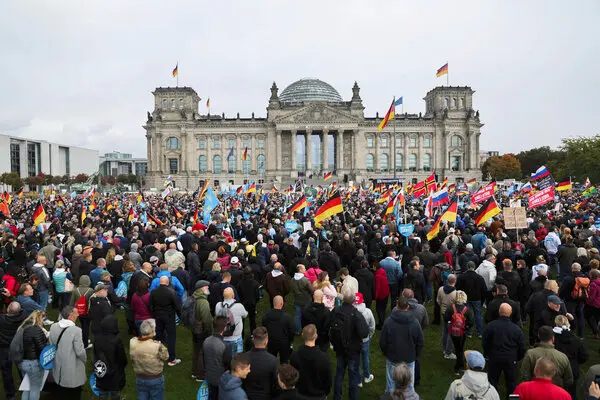A majority of Germans now support Ukrainian territorial concessions to Russia in exchange for peace, according to a new poll, as diplomatic efforts continue amid ongoing military tensions.
The Forsa polling institute found that 52% of respondents believe “Ukraine should be ready to cede occupied territories to Russia if necessary to enable a peace agreement,” according to RTL/ntv-Trendbarometer data collected on 18-19 August from 1,002 respondents.
Support for territorial concessions varies significantly by political affiliation, according to the report. Among supporters of the far-right Alternative for Germany (AfD) party, 72% endorsed the idea. Conservative CDU/CSU supporters showed less enthusiasm at 43%, while Social Democrats registered 48% support.
The polling results emerge as diplomatic initiatives intensify. Ukrainian President Volodymyr Zelenskyy identified potential meeting locations for negotiations with Russia, mentioning Türkiye, Gulf states, and several European countries as possible venues for peace talks.
“From our side, everything will be maximally ready to end this war,” Zelenskyy said in his evening video address on 26 August, while emphasizing the need to maintain pressure on Moscow “to rid the Kremlin of delay tactics.”
Meanwhile, tensions between Washington and Moscow continue. US President Donald Trump criticized Russia following the latest attacks on Ukrainian infrastructure, dismissing Moscow’s challenges to Zelenskyy’s legitimacy as posturing.
German Chancellor Friedrich Merz accused Putin of employing “delay strategies” regarding peace efforts. Putin considers it appropriate to attach preconditions to a meeting with Zelenskyy that are “completely unacceptable” from Ukraine’s and its Western partners’ perspective, Merz told reporters in Berlin.
The Kremlin echoed these delays, with spokesman Dmitry Peskov emphasizing that any high-level meetings require “good preparation to be effective.” Russian and Ukrainian delegation heads remain in contact, Peskov said, though he could not provide a timeline for potential talks.
On the battlefield, Russian forces continue advancing in eastern Ukraine. Ukrainian military analysts reported Russian troops entered Dnipropetrowsk Oblast, marking territory in Zaporiske and Novoheorhijiwka as occupied. Ukrainian forces disputed complete Russian control, with the “Dnipro” army grouping stating they “stopped the advance of Russian forces and continue to control the village of Zaporiske.”
The conflict’s humanitarian impact persists, with over 100,000 consumers losing power across three Ukrainian regions following Russian attacks on energy facilities, Zelensky reported on social media platform X.
Ukraine has adjusted some wartime restrictions, lifting the exit ban for men aged 18-22. Prime Minister Julia Svyrydenko announced that “men between 18 and 22 can cross the border unhindered during martial law,” citing educational opportunities abroad and maintaining connections with compatriots overseas.
The polling data reflects shifting German public sentiment as the conflict approaches its third anniversary, with economic and diplomatic pressures mounting on all parties involved in the ongoing war.




